Journalist Influenced by 16 Years in South Africa
Homepage photo: Kenneth Walker tells the Journal-isms Roundtable in 2019 about his 16 years in South Africa. He is at the famed Mr. Henry’s restaurant in Washington, known for launching the career of Roberta Flack. (Credit: Bonita Bing/Tolbert and Bing Studios)
Support Journal-ismsDonations are tax-deductible
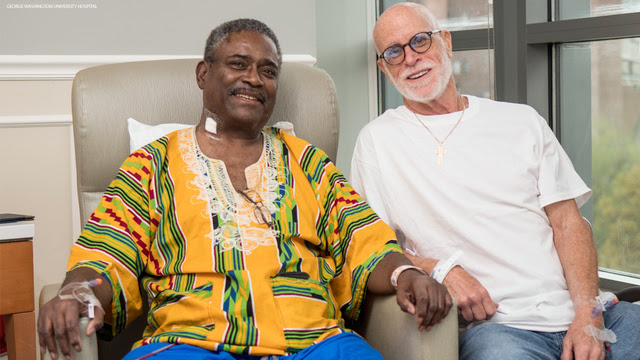
Journalist Influenced by 16 Years in South Africa
Kenneth Walker, a veteran journalist whose international outlook led him to live and work for 16 years in South Africa in a career that included work with the Washington Star, NPR, ABC News and the short-lived “USA Today: the Television Show,” died Friday at George Washington University Hospital in Washington, his cousin, Jeff Brown, told Journal-isms Saturday. He was 73 and had a sudden “cardiac event” Friday night, Brown said he was told.
Walker began his journalism career at the Star, a hometown newspaper where he worked for 13 years. When the newspaper folded in 1981, Walker joined the ABC News bureau in Washington, where he was a political correspondent, White House correspondent and substitute news anchor. Upon leaving ABC News in 1988, Walker was named anchor for the USA Today syndicated television series. He went on to become an independent television producer and correspondent, and a columnist.
As an independent journalist, by 1990 Walker was producing “The Jesse Jackson Show” on television (he had covered Jackson’s 1984 presidential campaign) and started his own business, Lion House Publishing. In 1995, Lion House produced a collection of the work of veteran journalist Earl Caldwell, “Black American Witness: Reports From the Front.”
Those who were present will long remember when Walker received what was then the highest honor from the National Association of Black Journalists, the Frederick Douglass Lifetime Achievement award, and scolded the organization for not recognizing that Douglass’ name was misspelled. In 1985, he shared honors with Newsday’s Dennis Bell as NABJ’s “Journalist of the Year.”
But Walker’s most searing memories were from the time he spent in Africa, first as NPR bureau chief and then as an independent journalist.
When Walker returned to the United States in 2015 after living and reporting from South Africa since 1999, he gave fellow members of the Journal-isms Roundtable a startling view of what America looked like from abroad.
“I became deathly afraid for you,” he said as he discussed not only the reporting of police killings of African Americans and other gun violence, but even the corruption of American food — “There are a lot of countries where you can’t import U.S. food” — as well as “the whole feeling of being unsafe.”
Back in the States, it seemed America didn’t disappoint. Walker told the group in November 2021 that the United States is an “active crime scene,” with enough evidence of anti-Black atrocities to bring it before the United Nations for crimes against humanity. “The media, including most Black journalists, are ignoring these processes. And we shouldn’t be,” Walker said.
When the Roundtable heard that year from Malcolm Nance, the author, commentator and former counterintelligence agent, just back from Ukraine as Russia was about to invade, Walker took note of the lack of Black correspondents there. Attendees had all heard some white reporters remark that the Ukrainians were “just like us,” for which some later apologized.
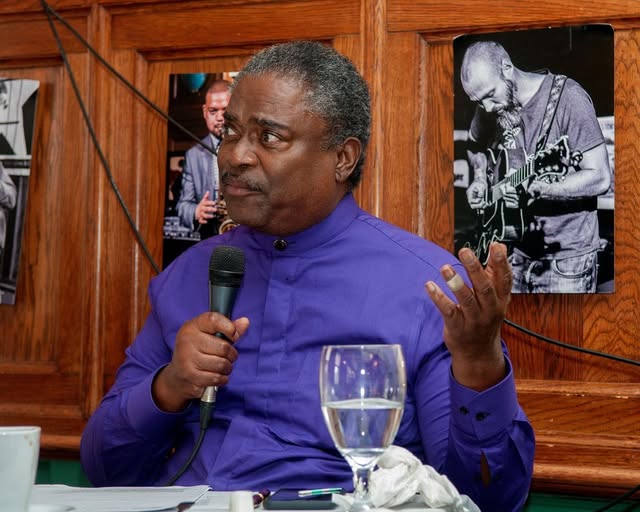
While in South Africa, “”I became deathly afraid for you,” Walker said in 2019 as he discussed the reporting of police killings of African Americans and other gun violence. (Photo by Bonita Bing/Tolbert and Bing Studios)
Walker told the Roundtable, “I’m here to tell you, white people who are foreign correspondents for the U.S. in general tend to be some very racist people. They are supporting and advancing white supremacy. . . . They’re not there with any sensitivity to certainly people of color in places that they’re deployed. And so this is just par for the course. . . .”
At a commemoration in 2019 of the landing of the first Africans in British Virginia in 1619, Walker was on a panel that bemoaned the U.S. export of negative Black images. They agreed that the “N Word” and the “B Word,” familiar terms in much of rap music, had gained a foothold in Africa and elsewhere thanks to American pop culture. Walker said that in South Africa, “I would call ’em on it every time. I asked what If I said ‘kaffir’ this,” referring to a South African slur referencing Blacks.
Still, it was back in the States, in 2018, that Walker found what he had desperately searched for: “Charlie Ball, a man I barely recalled from high school 50 years ago, rescued me from a slow death by donating one of his kidneys. . . .
“Today, we are brothers,” Walker declared.
Walker also became a consistent advocate for reparations, as well as pursuing crimes against humanity.
At a 2023 Roundtable, journalist and author Ellis Cose said, “When we’re talking about reparations, we’re talking about systemic issues that have affected us economically and otherwise, which originated in the era of slavery.”
Walker replied (1:11 on video), “Beyond that, there are also issues of crimes against humanity. These are crimes . . . that we and others have alleged at the proper international forum — in the U.N., the International Court of Justice, where evidence must be taken, judgment must be determined.
“Justice must be served, people must be found guilty or not on these crimes. . . . That’s how — that’s really how we get into the difference between reparations and crimes against humanity.
“Reparations, for the most part deals with things that have happened that people want to make restorative justice toward. Continuing crimes against humanity is a separate matter that needs to be pursued equally vigorously.”
Walker was among the Black journalists who grew up during the civil rights movement and were among the first to be hired in significant numbers by white-owned newspapers.
In 2022, Walker noted the 41st anniversary of the day the Washington Star closed. “I had the fellowship of some of the best journalists in the business. Each task I chose proved to be the best for journalists in training. . . . The Star gave me a career that I treasure and friends I adore. It also gave me a life. And for that, I will always be grateful.”
Walker told the story on Facebook: “For most of my friends and colleagues there at the end, The Star is remembered as perhaps their best job ever.
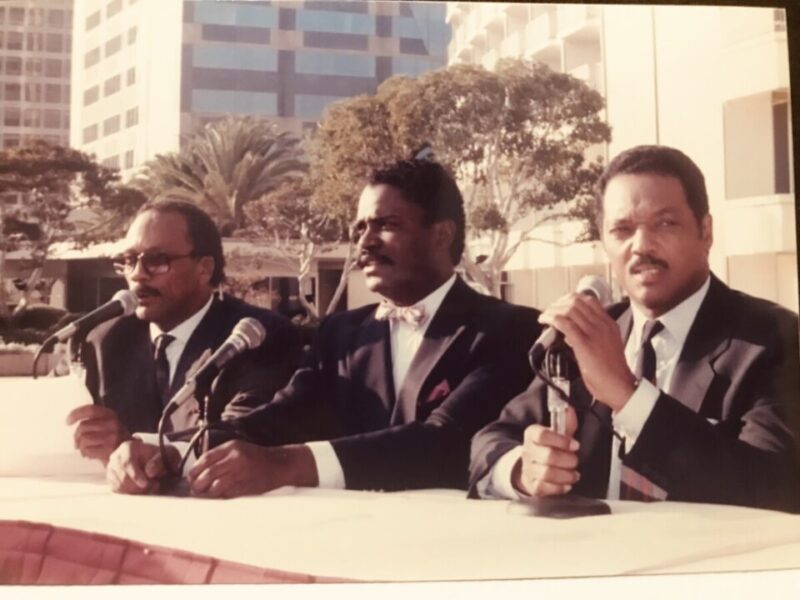
From left, Quincy Jones, Kenneth Walker and Jesse Jackson at the 1990 National Association of Black Journalists convention in Los Angeles to promote “The Jesse Jackson Show.” (Credit: Jason Miccolo Johnson)
“It was much more than that for me. I came to the Evening Star in 1969, as a recent high school graduate in search of a college education and a job to support a new pregnant wife.
“I’d heard of a new scholarship program at the Catholic University of America. Like numerous other colleges immediately following the assassination of Dr. Martin Luther King Jr, CUA joined with businesses to create scholarships for inner city Black youth who would become the first generation of their families going back to slavery ever to attend a university.
“Urban police and fire departments, newspapers, radio and television stations, union-affiliated apprentice programs, municipal, state and federal agencies, and a wide variety of private businesses all responded to the unrest with attempts to begin or increase the hiring of African Americans.
“Several of these groups, like business, media and law enforcement, had more self-interested motives. At a time when many Black communities were in open rebellion, organizations like police and the media had largely segregated work-forces that either would not or could not go into areas of unrest. These racist hiring practices made it impossible for the media to keep the public informed, or for the cops to keep the white public safe.
“Across virtually all sectors, in business, government and higher education, a variety of so-called affirmative action programs were created that, viewed together, caused the greatest improvements in Black lives since Reconstruction.
“I missed the initial scholarship deadline but a counselor there was good enough to suggest I visit The Star to ask for a scholarship. I was too young to know how ridiculous this was, so I went.
“An executive spoke with me for an hour and gave me a tour of the building, then in the same neighborhood as my home on Capitol Hill.
“The very idea of journalism as a career had never occurred to me, but by the time my visit was over, I was hooked. We began the tour in the press room, where gigantic machines generated deafening roar in printing the daily paper. It had an almost entirely white workforce, most of whom were covered in ink and wore hats fashioned from newspaper. That was followed by a stop in the photo department where ribbons of film dangled from the ceiling, while editors would cut and examine individual images on white counters.
“We wound up in the newsroom which proved beyond my imagination. Shrouded by a pall of cigarette smoke, it was a beehive of activity, with everybody seeming to be in a hurry to go somewhere. There were numerous clutches of conversations, some profane, but all enormously interesting. I was exhausted by the time I left.
“Within days, I learned that not only did I get the scholarship, but an entry-level job to boot at what was then known as a copy boy.
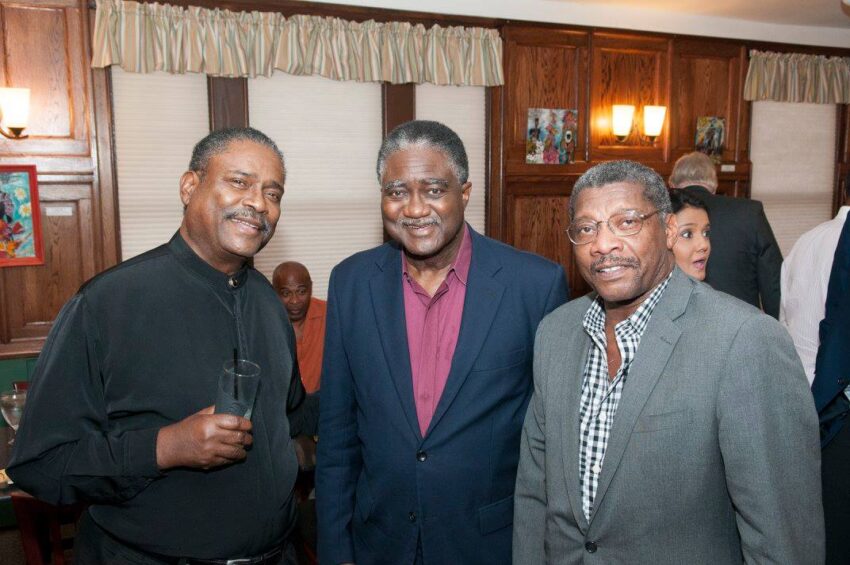
Kenneth Walker, left, with fellow Black journalism legends George Curry, center, and Sylvester Monroe at a Journal-isms Roundtable in September 2015. (Credit: George Tolbert IV)
“There was no better place to learn journalism. . . . I started covering high school sports, and writing for obituaries, followed by a stint on the night-time police desk. Each assignment inevitably drew tremendous scrutiny, which led to developing a quick talent for accuracy. But I rose through the ranks, as a city reporter, then a national and foreign correspondent. By the time the paper closed, I’d drawn enough attention to receive several newspaper and broadcasting job offers. I chose ABC News.
“So today I join many Star friends and alumni in fondly recalling our years there. But my feelings extend far beyond fondness. The Star gave me a career that I treasure and friends I adore. It also gave me a life. And for that, I will always be grateful.”
Walker had said he was working on two books, one on the origins of the current assault on the nation’s fragile democracy and the other a memoir.
In a 2019 tribute to Bell, his kidney donor, Walker wrote on Facebook, “As the recipient of a kidney, I cannot donate remaining organs for transplant, but I have taken steps to donate my body to the Howard University School of Medicine.
“Charlie’s gift has also been as much a gift of spirit as one of life. As a member of the last generation of the civil rights movement, I have spent my life on the front lines of America’s continuing struggle with its formerly enslaved citizens. Sometimes, it seems as if that struggle is being won. Sometimes not. In my lifetime, It has never seemed more out of reach than it is today, when white supremacist terrorism is growing steadily.
“Charlie has proven to be an indispensable reminder never to stop looking for the humanity in all people, however difficult that might be, from time to time. Charlie’s gift was exceptionally well-timed, coming as it has in the age of the most aggressively white supremacist president in at least a century.”
Leon Harris Leaves Station, Citing His Health
April 8, 2025
D.C. Anchor Was on Months-Long Leave of Absence
Park Service Restores Tubman Image After Backlash
Judge Orders White House to Restore AP Access
On-Air Proposal Went Viral; Now They’re Married
Boston Globe Delivers Multicultural View of 1776
Winning a Pulitzer Doesn’t Mean You Don’t Hurt
Foreign Reporters in U.S. Fear Harm if Deported
Short Takes: Black radio consumers; Henry Louis Gates Jr.; Amber Ruffin; Grist and indigenous media; Tracie Powell; Doug Mitchell; Morgan State University’s School of Global Journalism & Communication and Cuba
Support Journal-ismsDonations are tax-deductible
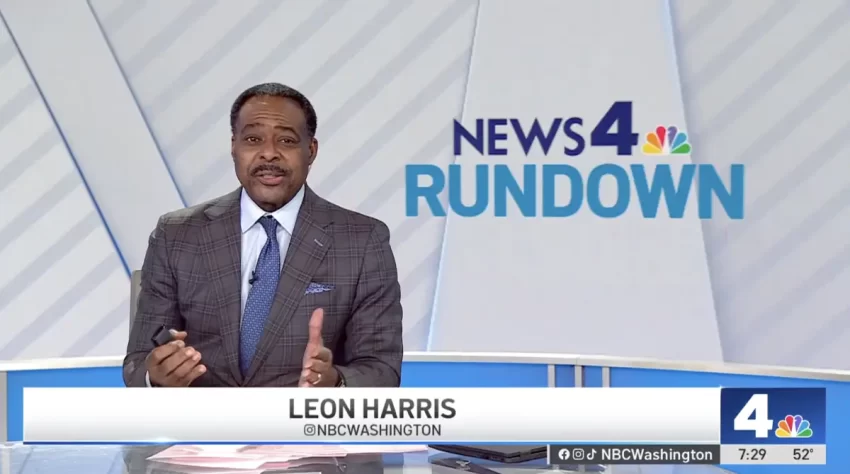
D.C. Anchor Was on Months-Long Leave of Absence
Leon Harris, an anchor for the NBC owned-and-operated WRC-TV in Washington, D.C. — who took a leave of absence four months ago “to focus on health and family” after appearing to slur his words on a Thanksgiving broadcast — is leaving the station, Harris and WRC announced Tuesday.
“After 40+ years of nonstop work and the dramatic changes in the news and television industry, I’ve made the difficult decision to step away from my role at NBC4. I’m grateful to NBC4 for having me as part of their team for the last eight years,” Harris, 63, wrote.
“This is the right time to prioritize my health and family,” he added. “A special thanks to my amazing colleagues, friends, and especially to our viewers who welcomed me into their homes. It’s been an honor. Thank you.”
The station posted Harris’ statement, then added, “We are grateful for Leon’s eight years of service to our newsroom. We thank him for his commitment to our community, dedication to journalism, hard work, and friendship. He will be missed, and we wish him nothing but the best.”
The station confirmed that Harris’ departure was permanent, David Chiu and Charna Flam reported for People.
By Wednesday afternoon, the station’s posting of Harris’ statement on Instagram a day earlier had surpassed 6,000 “likes.”
Comments were supportive. “Your kindness and empathy was unmatched and your laugh unmistakable. And your openness during your recovery was refreshing and inspiring. With gratitude. 
View this post on Instagram
If no image is visible, please consider using another browser.
Harris’ health issues were never disclosed. He was sentenced to jail time and probation in 2022 after being arrested for driving under the influence of alcohol.
He said then, “I admitted in court today something that I have come to fully accept. I made a terrible decision to drink and drive. That is something I am grateful to have survived and something for which I will have to pay a debt to society. I am looking forward to doing so, and being a better and healthier person, husband and father in the process. My alcoholism will not be the end of me, but my acknowledging it is going to be a new beginning for me.”
Upon his return to the air, Harris said, “I deserve a shot at earning your trust and respect again. And the only way I can do that is through patterns, not promises.”
[Edward Segarra added for USA Today, “Just because someone is in the public eye doesn’t render them immune to pain or suffering — from a serious health condition or gossip.” He also wrote, “Here are more stars who opened up about their health struggles.”]
Harris joined WRC in 2017 as a veteran news anchor who spent 13 years covering the Washington area at WJLA-TV, an ABC affiliate. “During that time, he was a stable force on the station’s evening and 11 p.m. newscasts, hosted specials and weekly shows, and reported on those in our community doing good work through his Harris’ Heroes segment,” WRC said then.
Harris came to Washington after more than 20 years at CNN’s Atlanta Headquarters, where he co-anchored “CNN Live Today” and “Prime News,” and hosted “CNN Presents” and “American Stories.”
At the time, he was CNN’s last remaining Black male weekday anchor. “I hit my 20th anniversary in July, and it became increasingly clear that there wasn’t much else for me to do at CNN,” the Atlanta Journal-Constitution quoted Harris as saying.
- Paul Farhi, Washington Post: News Man: WJLA Channel 7 bet its future on Leon Harris. Signs are, it’s beginning to pay off. (Feb. 28, 2010)
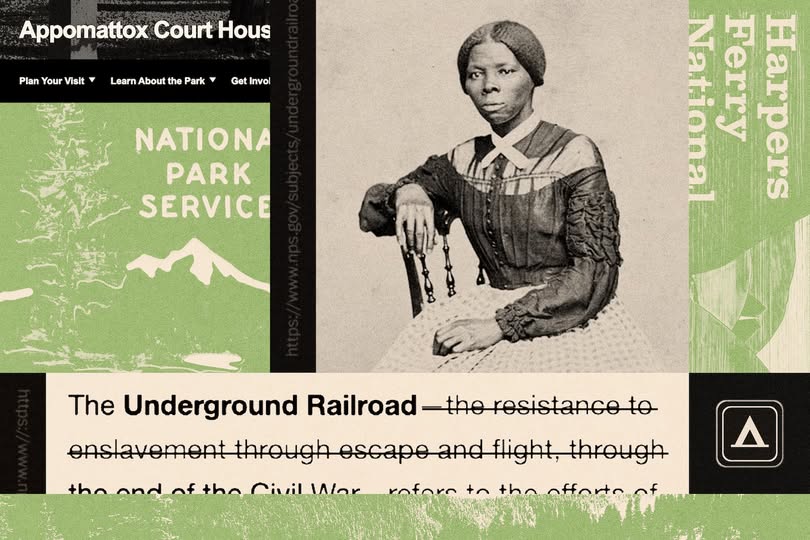
Park Service Restores Tubman Image After Backlash
“The U.S. National Park Service on Monday appeared to restore its original webpage on the history of the Underground Railroad after it was met with backlash for deleting a prominently featured photo of abolitionist and women’s suffragist Harriet Tubman, as well as segments of text describing the horrors of slavery,” Kelly Kasulis Cho reported Tuesday for The Washington Post.
“The changes were first reported by The Washington Post on Sunday.
“President Donald Trump issued an executive order late last month directing the Smithsonian Institution to eliminate ‘divisive narratives’ — a move that spurred fears that his administration aimed to whitewash American history. Trump has also broadly pushed to remove what he has called ‘the tyranny’ of diversity, equity and inclusion (DEI) policies at U.S. schools, universities and other institutions.
“Part of the restored text describes the 18th- and 19th-century Underground Railroad as ‘efforts of enslaved African Americans to gain their freedom by escaping bondage.’ Tubman was one of the system’s best-known ‘conductors.’
“The Post quoted two Park Service employees, who spoke on the condition of anonymity because they feared retribution, who said that political appointees at the Interior Department — which oversees the National Park Service — had directed senior career officials to identify webpages that might need to be changed. . . .”
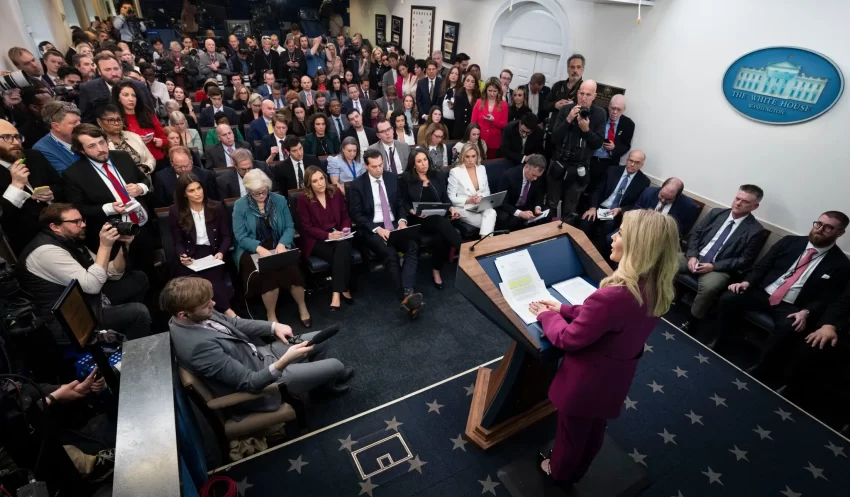
Karoline Leavitt, the White House press secretary, speaks to reporters. (Credit: Doug Mills/New York Times)
Judge Orders White House to Restore AP Access
“A federal judge on Tuesday ordered the White House to restore The Associated Press’s full access to President Trump, finding that the effort to ban the outlet over objections to its coverage violated the First Amendment,” Zach Montague reported Tuesday for The New York Times.
“The order dealt a blow to Mr. Trump, who, in a departure from decades of tradition, has moved to leverage access to presidential events as a way of asserting more direct control over how news organizations cover his administration. Trump officials began barring the outlet from physically covering events with the president in February, citing the wire service’s refusal to adopt the administration’s renaming of the Gulf of Mexico to the Gulf of America.
“The outlet sued, with the dispute raising profound questions about the independent news media’s role in covering presidential administrations and the lasting implications of Mr. Trump’s efforts to refigure the White House press corps.
“In a sharply worded opinion, Judge Trevor N. McFadden of the Federal District Court for the District of Columbia wrote that the Trump administration must ‘immediately rescind their viewpoint-based denial’ of The Associated Press from presidential events. . . .
“Moments after issuing the opinion, Judge McFadden paused his own order from taking effect until Sunday, giving the government five days to file an emergency appeal. The injunction he ordered would stay in place until the case is over, or a higher court intervenes.
“The ruling came in response to a lawsuit The Associated Press filed in February, which asked that its longstanding access to smaller press events at the White House be reinstated.
“Since the lawsuit was filed, the administration has prevented the publication from participating in the press pool, a rotating group of reporters that covers the president’s day-to-day activities, and blocked it from covering the president in intimate settings such as the Oval Office and Air Force One. . . .”
“The government filed a notice of appeal early Wednesday afternoon on behalf of the three officials sued by the AP — White House press secretary Karoline Leavitt, White House chief of staff Susan Wiles and deputy chief of staff Taylor Budowich. The one-page notice of appeal gave no other details,” the Associated Press reported.
- Jon Allsop, Columbia Journalism Review: What Can a Journalist Do?
- Johanna Alonso, Inside Higher Ed: Should Student Journalists Censor Protesters’ Names?
- Mary C. Curtis, Roll Call: Have American citizens finally started paying attention?
- Megan Lebowitz, NBC News: Republican senator floats using violence against journalists who report ‘fake news’
- E.R. Shipp, NABJ Black News & Views: Protesters tell Trump ‘Hands Off’ Smithsonian’s African-American museum, Social Security, more

“Becoming Cornelia’s husband is something I’ve looked forward to for so long,” Riley Nagel says of his broadcast colleague. “She is just my best friend and I love being around her. She’s the person I want to spend the rest of my life with.” The wedding went national, with a report posted on the People magazine site on Monday. (Credit: WKCB)
On-Air Proposal Went Viral; Now They’re Married
“After the viral on-air proposal of Local 3’s Riley Nagel and Cornelia Nicholson, the two love birds officially tied the knot on March 29,” WRCB-TV in Chattanooga, Tenn., known as Local 3, reported Monday.
“The power couple first met as reporters in Billings, Montana in 2020, and fell in love quickly.
“By 2022, they moved to Chattanooga, TN, to join the Local 3 team, later becoming a morning reporter and weekend anchor.
“The couple grew in their careers (and love for each other) until August of 2023, when Nagel got down on one knee while Nicholson was recording promos after the evening newscast.
“The heartwarming moment went viral — gaining 3.4 million views on Youtube and 8.3 million on TikTok.
“On March 29, 2025, the couple was ready to join together as one, proclaiming their love for one another in front of friends and family in Bryant, AL.
“From everybody at Local 3 News – congrats to the Nagels on their best story yet!”
Tariro Mzezewa reported for The New York Times in 2021 that in Alabama, “The State Constitution included a ban on interracial marriage until a statewide vote in 2000, even though the U.S. Supreme Court ruled such marriages to be fully legal in all states in 1967.
” ‘The Legislature shall never pass any law to authorize or legalize any marriage between any white person and a Negro, or descendant of a negro,’ the State Constitution once said.”
Design and art direction: Heather Hopp-Bruce/Boston Globe
Boston Globe Delivers Multicultural View of 1776
Readers of the Boston Globe last week were greeted by a multicultural discussion of the significance of the American Revolution, with a dissection of Black participation drawing raves among those with whom Journal-isms shared that contribution, written by historian Leslie M. Harris of Northwestern University.
“For Black people, the Revolution was full of paradoxes,” read the headline over Harris’ piece. “Some fought for the British. Others went to war for the colonists, who compared their own plight to enslavement even as they perpetuated it.”
It was part of an eight-piece package with the title, “The Revolution lives on: 250 years later, the fight for American independence is still full of surprising stories and unresolved questions. Explore them in this special issue of Globe Ideas.”
Although the Globe is behind a paywall, you can access the series’ landing page and read one piece at no charge via this link.
The others:
- “The legacy of the Revolution is still up for grabs” by Ted Widmer
- “Native Americans Helped Spark the Revolution” by Ned Blackhawk
- “A debate as old as the country itself: When did the Revolution truly begin?” by Gordon S. Wood
- “How the Revolution Carved Out the Space for Women’s Liberty” by Craig Fehrman
- “The things you learn making a film about the Revolution” by Ken Burns, Sarah Botstein and David Schmidt
- “Why Boston was such a tinderbox in the 1770s,” by Jane Kamensky
- “What if the Revolution was a big mistake? — Basically, we would be Canada. I don’t think that’s so bad” by Alex Beam
Brian Bergstein, the Globe’s ideas editor, said his aim was to chronicle the revolution through “a set of interesting stories” that would make clear there are “still a lot of unanswered questions” and “still a lot of interesting scholarship about the Revolution,” he told Journal-isms.
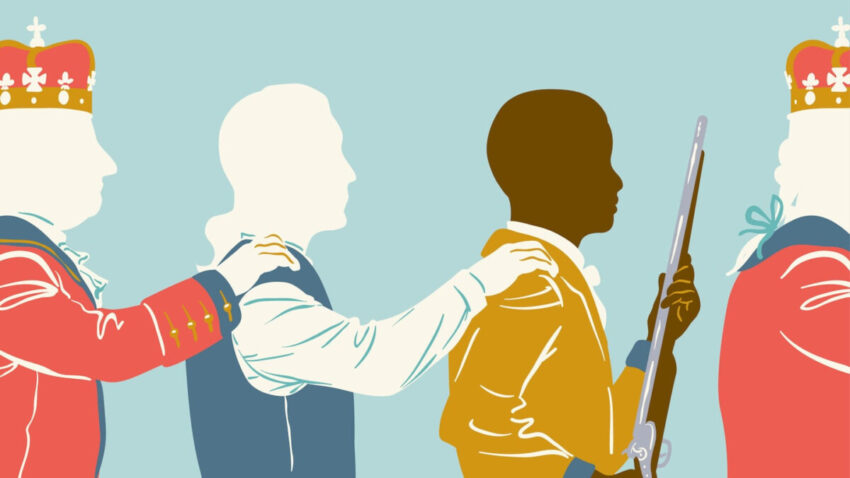
Design and art direction: Heather Hopp-Bruce/Boston Globe
Under such subheadlines as “How Black soldiers got drawn into the war” and “The arrogance of a new nation,” Harris tells of an American history that too few know:
“No people of African descent participated in the meetings to develop the Declaration of Independence or the Constitution, unless they were there to serve the white men designing the new nation. But they were not ignorant of the changes around them,” one passage goes.
“Enslaved Africans had struggled for their freedom long before the Anglo-American colonists declared independence from England.
“They included the 11 enslaved men who in 1644 negotiated their freedom from the Dutch New Netherland colony that owned them; those who fled from enslavers in South Carolina and Georgia to Spanish Florida, including the participants in South Carolina’s Stono Rebellion in 1739; and the numerous runaways who sought sanctuary with native peoples and sometimes comradeship with white working-class people throughout the Colonies.
“As the colonists began their arguments with Great Britain, enslaved people petitioned Colonial legislatures for their freedom, beginning in Massachusetts as early as 1773, followed soon after by groups in most Colonies. But freedom would not come for all Black people until nearly a century later, with the passage of the 13th Amendment in 1865.”
Asked why this information is important now, Harris messaged Journal-isms:
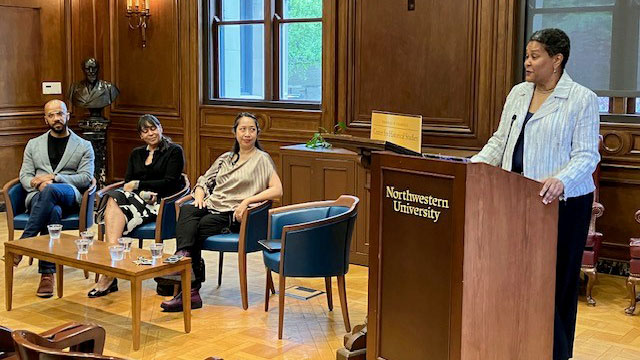
Leslie M. Harris at Northwestern University: “Many of the most expansive and generous ideas of the United States actually emerged from the people, broadly defined.” (Credit: Northwestern University)
“There are those among us who want to imagine that the United States was perfect from its inception, that the Founding Fathers (in their definition, white men only) created a perfect union, and that non-whites are just complainers, and don’t really belong, and also had nothing to do with the establishment and the ongoing work of being a citizen of this nation.
“In addition, the Founding Fathers are often excused as ‘men of their times’ or people who somehow didn’t know that enslavement of people of African and Native American descent, as well as taking land from Native peoples were moral and political problems.
“But there was an important and growing debate about these and many other issues. There was a constant discussion and debate about the meaning of what we today call human rights; equality; democracy. Non-white people, and women, were intimately engaged in this debate, and tried to claim rights. They were actively ignored. These are lessons for our current moment.
“Looking back, some wish to pretend that the meaning of freedom, democracy, human rights, equality, only descended from elites. But many of the most expansive and generous ideas of the United States actually emerged from the people, broadly defined.”
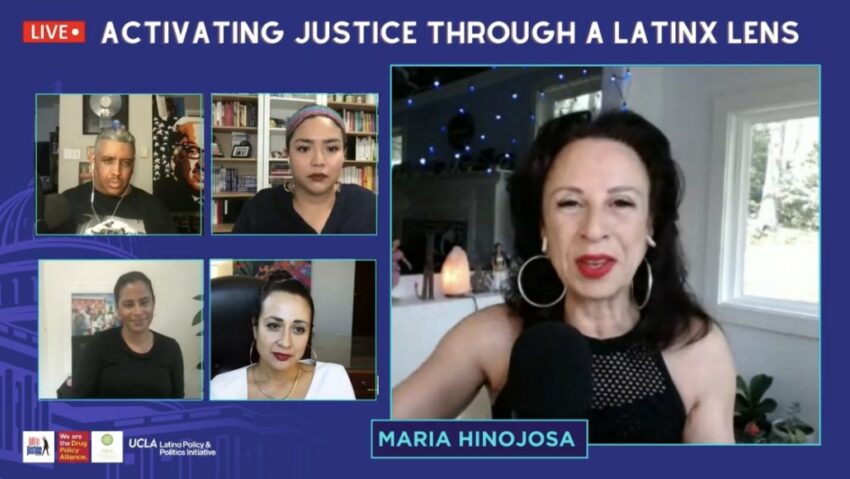
At the UCLA College of Social Sciences, a session moderated by “Latino USA’s” Maria Hinojosa with author and education advocate Julissa Arce, MacArthur “genius” award winner and UCLA faculty member Dr. Kelly Lytle-Hernández, Judge Natalia Cornelio of the 351st District Court, Harris County, Texas, and David Luis ‘Suave’ Gonzalez, host of “Death by Incarceration” and “The Suave Podcasts.” (Credit: UCLA College of Social Sciences)
Winning a Pulitzer Doesn’t Mean You Don’t Hurt
“On Oct. 20, 2022, David Luis ‘Suave’ Gonzalez found himself in a room full of journalists at Columbia University. It was a momentous day (scroll down) — the Pulitzer Prize awards ceremony. Gonzalez was there with award-winning journalist Maria Hinojosa, producer Maggie Freleng and others to celebrate winning a Pulitzer Prize for Audio Reporting,” Amaris Castillo reported Monday for the Poynter Institute.
“In 1988, Gonzalez was found guilty of first-degree homicide in Pennsylvania. He was a juvenile and sentenced to life in prison without parole. ‘Suave,’ the seven-part series co-hosted by Hinojosa and Freleng, focused on the criminal justice system through Gonzalez’s story. In the official announcement, Marjorie Miller — the administrator of the Pulitzer Prizes — called the podcast ‘a brutally honest and immersive profile of a man reentering society after serving more than 30 years in prison.’
“On the day of the awards ceremony, everyone dressed their best. Gonzalez wore a black suit and a bold red tie. He said everything seemed right on the outside when Futuro Media and PRX won the Pulitzer.
“ ‘But nobody ever asked me, am I hurting? Am I sleeping? Am I eating? Am I dealing with the trauma? Am I adjusting well?’ Gonzalez recalled in a recent call with Poynter. ‘Nobody ever asked no questions, because everybody always assumed that, “Oh, he’s doing great. He won the highest award in journalism.” Well, the reality is that, even when they announced the Pulitzer, I was going through real traumatic events in my life — which was trying to adjust into a community, trying to fit in into normal life out here.’
“The struggles of life after incarceration form the crux of the podcast’s new season, premiering April 7 — the same day Futuro Media launches Futuro+, a new subscription program offering new podcasts with ad-free listening, extended interviews and more. Listeners who sign up to be Futuro+ members get early access to ‘Suave: Season 2.’
“This new seven-part season will be available to all on April 15, one episode per week, wherever people get their podcasts. It will dive into the long shadow of prison and the trauma that continues to trail Gonzalez. While in prison, he lost family members, including his own mother. He was unable to attend the funeral.
“ ‘I never dealt with the trauma of incarceration. So I come home and I’m trying to live this normal life, but I’m still locked up mentally. I’m still incarcerated,’ he said. ‘I’m still functioning as if I’m still in prison. Can’t be in a relationship, because every relationship reminds me of my cellmates. “If we disagree, you got to move.” That’s not the way it is out here.’
“Like the first season, ‘Suave: Season 2’ also covers the source/journalist relationship-turned-friendship between Gonzalez and Hinojosa. They met in 1993 at the Graterford State Correctional Institution in Pennsylvania while Hinojosa was working on a story. . . .”
- Kevin “Rashid” Johnson, Prison Radio: I Now Face Retaliation and Censorship for Reporting Abuses (text) (March 20)
- Marshall Project: Prison Life (series)
- Bob Sillick, Editor & Publisher Magazine: From prison cells to bylines: The Ben Free Project creates opportunities for incarcerated journalists, writers and creative artists

“Created as a non-profit broadcaster in 1996 and funded by the US Congress via the Broadcasting Board of Governors, Radio Free Asia aims to provide independently- reported news and information to Asian countries that have little or no alternative to government propaganda,” says Reporters Without Borders.
Foreign Reporters in U.S. Fear Harm if Deported
The Trump administration “has been dismantling or slashing the size of federal agencies, leading tens of thousands of government workers and contractors to be fired or put on leave,” Didi Tang reported Sunday for the Associated Press. “But the targeting of the U.S. Agency for Global Media, whose decades-old networks aim to extend American influence abroad, means journalists who have defied authoritarian regimes to help fulfill a U.S. mission of delivering pro-democracy programming could be deported and face harassment and persecution in their homelands.
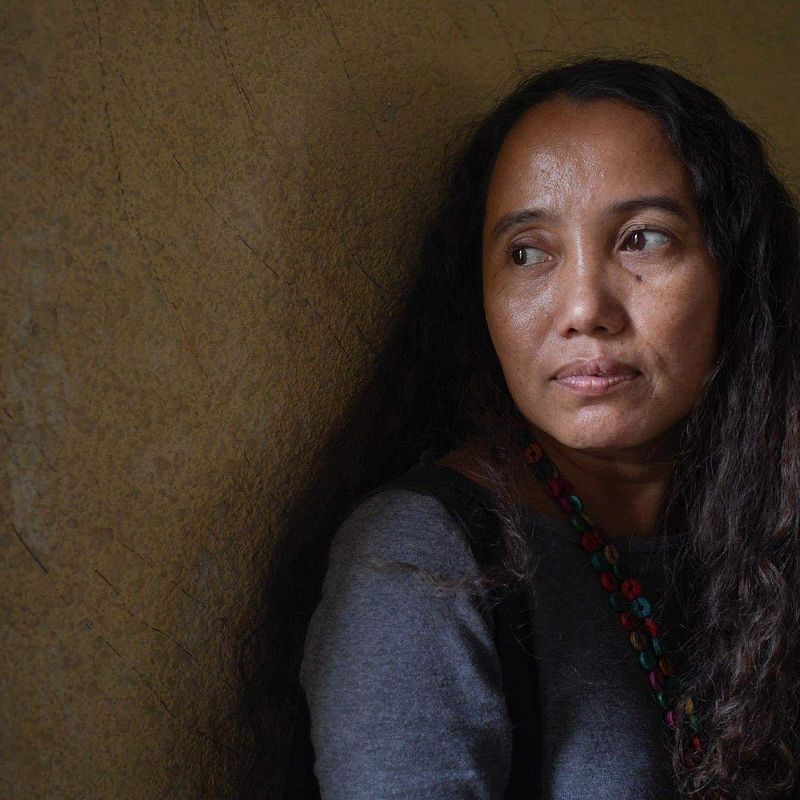 “Eleven journalists associated with the U.S.-funded media outlets are behind bars overseas, including [Radio Free Asia’s] Shin Daewe (pictured), who is serving 15 years in Myanmar on a charge of supporting terrorism.
“Eleven journalists associated with the U.S.-funded media outlets are behind bars overseas, including [Radio Free Asia’s] Shin Daewe (pictured), who is serving 15 years in Myanmar on a charge of supporting terrorism.
“At least 84 U.S. Agency for Global Media, or USAGM, journalists in the United States on work visas could face deportation, including at least 23 ‘at serious risk of being immediately arrested upon arrival and potentially imprisoned,’ according to the advocacy group Reporters Without Borders and a coalition of 36 human rights organizations.
“ ‘It is outrageous that these journalists, who risk their lives to expose the extent of repression in their home countries, might be completely abandoned,’ said Thibaut Bruttin, director general of Reporters Without Borders.
“ ‘The U.S. Congress must take responsibility for protecting these reporters and all USAGM-funded outlets, funded by Congress itself,’ Bruttin said. ‘This responsibility is not just moral — it stems from the United States’ commitment to defending the principles of democracy and press freedom.’
“The Senate Foreign Relations Committee and the House Foreign Affairs Committee did not respond to requests for comment. The White House did not comment.
“The State Department said it is coordinating with USAGM on imprisoned journalists and that it condemns unjust detentions of journalists for exercising their freedom of expression.”
Short Takes
- “Despite the proliferation of digital media, nearly 90% of Black consumers continue to rely on radio as a trusted source for entertainment, information, and community connection, the National Association of Black Owned Broadcasters (NABOB), in collaboration with Nielsen, reported Monday. Their report, “Reaching the Culture: Investing with Audio to Win with Black Consumers,” “also sheds light on generational shifts in media consumption, particularly among Black Millennials — who are not only tech-savvy but serve as key influencers in their communities. With 55% identifying as trendsetters, and 50% more likely to purchase a product when endorsed by a local radio host, the value of culturally resonant advertising has never been clearer.” Inside Radio.
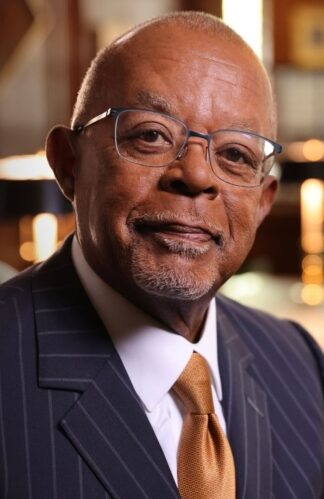 “For 11 seasons, Henry Louis Gates Jr. (pictured) has sat across from his guests on the popular PBS series ‘Finding Your Roots’ and led them through secrets in their family tree. On Tuesday, it’s his turn,” Mark Kennedy wrote Monday for the Associated Press. “The Harvard scholar learns a long-buried puzzle about his great-great grandmother, Jane Gates, information which scrambles his ancestry and opens up a new branch that goes back to Ireland. . . .”
“For 11 seasons, Henry Louis Gates Jr. (pictured) has sat across from his guests on the popular PBS series ‘Finding Your Roots’ and led them through secrets in their family tree. On Tuesday, it’s his turn,” Mark Kennedy wrote Monday for the Associated Press. “The Harvard scholar learns a long-buried puzzle about his great-great grandmother, Jane Gates, information which scrambles his ancestry and opens up a new branch that goes back to Ireland. . . .”
 “Comic Amber Ruffin (pictured) has a new spring gig,” Hillel Italie reported Monday for the Associated Press. “PEN America told The Associated Press on Monday that Ruffin will host the free expression organization’s gala fundraiser on May 15. The comic had been scheduled as a featured speaker April 26 at the White House Correspondents Association’ s annual dinner. But the WHCA rescinded the offer to Ruffin, a blunt critic of President Donald Trump, saying it wanted to focus on journalistic achievement. . . .”
“Comic Amber Ruffin (pictured) has a new spring gig,” Hillel Italie reported Monday for the Associated Press. “PEN America told The Associated Press on Monday that Ruffin will host the free expression organization’s gala fundraiser on May 15. The comic had been scheduled as a featured speaker April 26 at the White House Correspondents Association’ s annual dinner. But the WHCA rescinded the offer to Ruffin, a blunt critic of President Donald Trump, saying it wanted to focus on journalistic achievement. . . .”
 “For the fourth year running, Grist is organizing pooled coverage of the United Nations Permanent Forum on Indigenous Issues, the largest global gathering of Indigenous leaders and advocates. High Country News, Mongabay, ICT, and APTN News will once again be part of this collaboration. New members include Whakaata Māori, IndigiNews, Osage News, and The Associated Press, Rachel Glickhouse reported Tuesday for Grist. “Hailing from three countries and reporting for hundreds of Indigenous nations and peoples worldwide, the partnership also marks the launch of the Indigenous News Alliance, or INA: an international initiative to support cross-border collaborations and story sharing. . . . “
“For the fourth year running, Grist is organizing pooled coverage of the United Nations Permanent Forum on Indigenous Issues, the largest global gathering of Indigenous leaders and advocates. High Country News, Mongabay, ICT, and APTN News will once again be part of this collaboration. New members include Whakaata Māori, IndigiNews, Osage News, and The Associated Press, Rachel Glickhouse reported Tuesday for Grist. “Hailing from three countries and reporting for hundreds of Indigenous nations and peoples worldwide, the partnership also marks the launch of the Indigenous News Alliance, or INA: an international initiative to support cross-border collaborations and story sharing. . . . “
 “I put my house on the market last spring and learned surprising lessons — not just about home valuation but also about how the journalism and philanthropic industries value audiences and communities,“ Tracie Powell (pictured) wrote Monday for the Poynter Institute. “As I navigated the home-selling process, I saw firsthand how these valuation gaps play out in real time. Just as Black homeowners must push for fair appraisals and equitable treatment in real estate, BIPOC-led media organizations must continue advocating for fair funding and representation. Whether in journalism or housing, real equity requires more than just awareness — it demands action.”
“I put my house on the market last spring and learned surprising lessons — not just about home valuation but also about how the journalism and philanthropic industries value audiences and communities,“ Tracie Powell (pictured) wrote Monday for the Poynter Institute. “As I navigated the home-selling process, I saw firsthand how these valuation gaps play out in real time. Just as Black homeowners must push for fair appraisals and equitable treatment in real estate, BIPOC-led media organizations must continue advocating for fair funding and representation. Whether in journalism or housing, real equity requires more than just awareness — it demands action.”
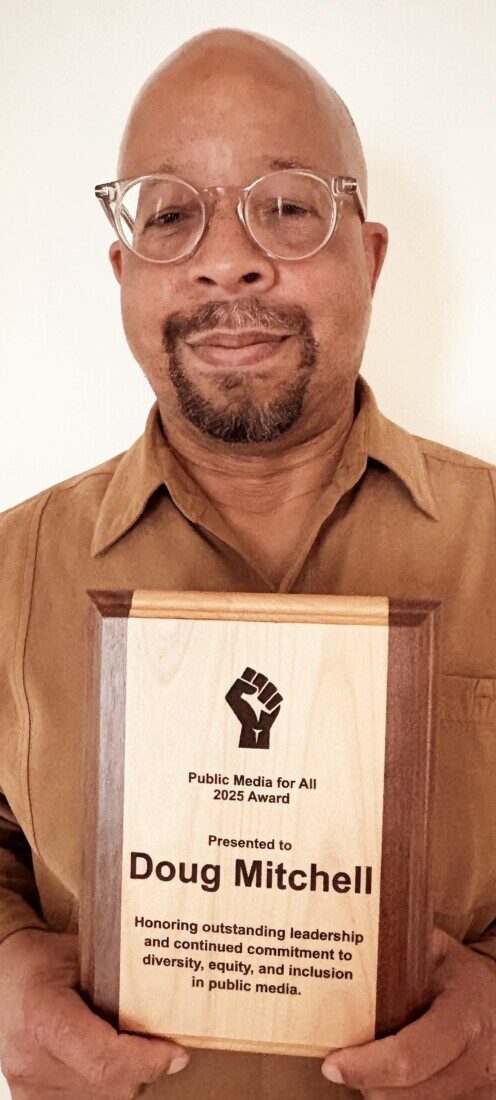 Doug Mitchell (pictured), founder/director of NPR’s Next Generation Radio, has won the Public Media for All Award from Public Media for all, which “was founded in 2020 with the goal of ensuring our industry served everyone, especially those who were historically underrepresented.”
Doug Mitchell (pictured), founder/director of NPR’s Next Generation Radio, has won the Public Media for All Award from Public Media for all, which “was founded in 2020 with the goal of ensuring our industry served everyone, especially those who were historically underrepresented.”
 Morgan State University’s School of Global Journalism & Communications is producing a documentary on a trip to Cuba last year in which the delegation described the United States as an apartheid country that bans Black books. The trailer is here. At the time, the United States had a Black vice president, two Black Supreme Court justices and a Black House Democratic leader, and authors of all races were the subject of book bans around the country. Meanwhile, Cuba more vigorously bans books and other publications that displease the government, as noted here.
Morgan State University’s School of Global Journalism & Communications is producing a documentary on a trip to Cuba last year in which the delegation described the United States as an apartheid country that bans Black books. The trailer is here. At the time, the United States had a Black vice president, two Black Supreme Court justices and a Black House Democratic leader, and authors of all races were the subject of book bans around the country. Meanwhile, Cuba more vigorously bans books and other publications that displease the government, as noted here.
To subscribe at no cost, please send an email to journal-isms+subscribe@groups.io and say who you are.
Facebook users: “Like” “Richard Prince’s Journal-isms” on Facebook.
Follow Richard Prince on Twitter @princeeditor
Richard Prince’s Journal-isms originates from Washington. It began in print before most of us knew what the internet was, and it would like to be referred to as a “column.” Any views expressed in the column are those of the person or organization quoted and not those of any other entity. Send tips, comments and concerns to Richard Prince at journal-isms+owner@
View previous columns (after Feb. 13, 2016).
View previous columns (before Feb. 13, 2016)
- Diversity’s Greatest Hits, 2018 (Jan. 4, 2019)
- Book Notes: Is Taking a Knee Really All That? (Dec. 20, 2018)
- Book Notes: Challenging ’45’ and Proudly Telling the Story (Dec. 18, 2018)
- Book Notes: Get Down With the Legends! (Dec. 11, 2018)
- Journalist Richard Prince w/Joe Madison (Sirius XM, April 18, 2018) (podcast)
- Richard Prince (journalist) (Wikipedia entry)
- February 2018 Podcast: Richard “Dick” Prince on the need for newsroom diversity (Gabriel Greschler, Student Press Law Center, Feb. 26, 2018)
- An advocate for diversity in the media is still pressing for representation, (Courtland Milloy, Washington Post, Nov. 28, 2017)
- Morgan Global Journalism Review: Journal-isms Journeys On (Aug. 31, 2017)
- Journal-isms’ Richard Prince Wants Your Ideas (FishbowlDC, Feb. 26, 2016)
-
Richard Prince with Charlayne Hunter-Gault, “PBS NewsHour,” “What stagnant diversity means for America’s newsrooms” (Dec. 15, 2015)
- Book Notes: Journalists Follow Their Passions
- Book Notes: Journalists Who Rocked Their World
Page view count: 2928 at 6:53 a.m. on April 23, 2025

